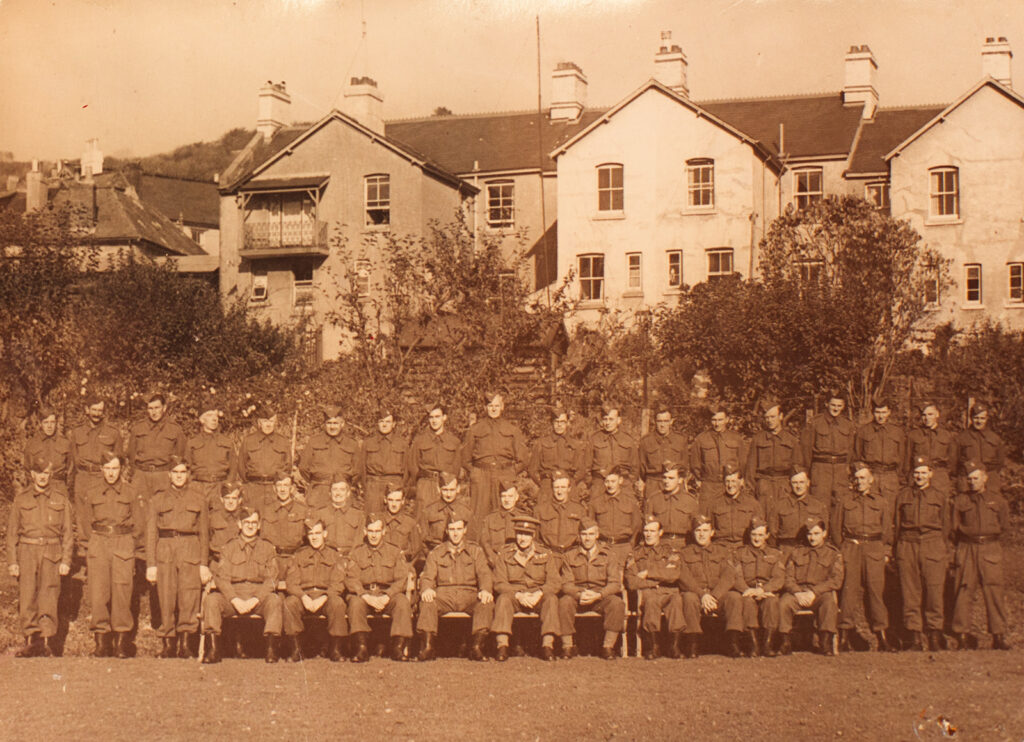Mrs E Quantick, (1909-1997) …in her own words
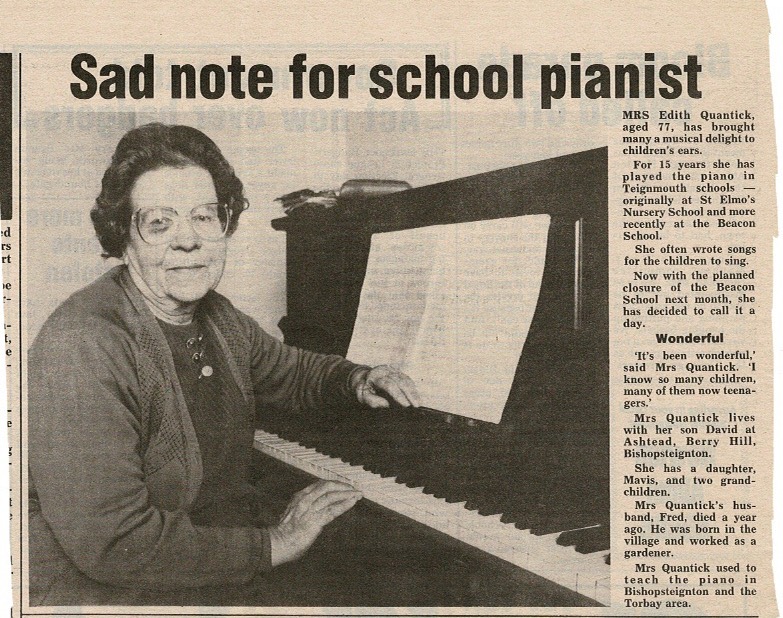
Edith Quantick retirement
Early life
I came to Bishopsteignton in 1928. My father, Mr F. E. Dale, because of ill health, had to retire from his printing business in Upper Thames St, London. This area was all swept away with the blitz.
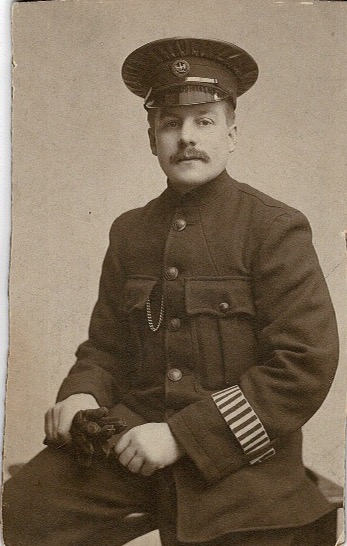
Mr Dale in the police force
We found it difficult to adjust to village life, it was all so different, and sometimes to us amusing. I remember the village bus used to pick up passengers at their door, and if someone was starting their journey, the bus waited while they kissed all the family goodbye.
The Victorian class distinctions were still felt strongly. Newcomers had to make up their minds to mix either with the villagers or the gentry who lived in the large houses and were mostly inaccessible. Whereas in London we hardly knew our neighbours, we soon found out that your private life somehow was known in the village, news flew like lightening. But when you were in trouble, everyone would offer sympathy and help if needed. The visit of the Doctor’s car would bring all your neighbours in to know what was wrong and could they help. I remember in later years, when my daughter was seriously ill, my husband and I had to walk up from the main road when we visited her in hospital, and our way through the village was halted by villagers coming out to ask how she was. One day we reported that she was now allowed fruit, one lady instantly rushed indoors and brought us out some oranges.
Opposite to Ashtead where we lived was the workshop of Mr Berry, who made coffins. For some reason he always worked after dark, and caused us much uneasiness moving about with a lighted candle with all those wood shavings. Our road used to be part of Back Lane (now called Manor Rd), but was renamed later by the council to ‘Berry Hill’, in remembrance of old ‘Dicky’.
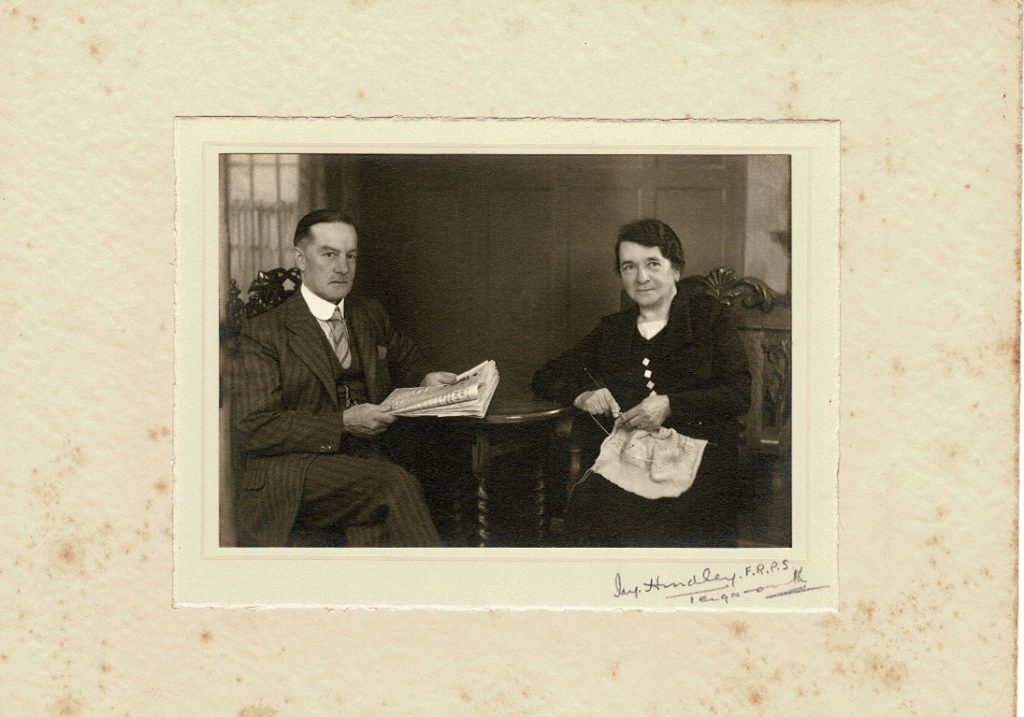
Mr & Mrs F E Dale
My father soon got involved in village affairs. After all these years I cannot remember in what order. For some years he was one of the school managers. He took the part of Father Xmas at their party, and when my two children were at the school, they never thought of him as Grandad dressed up, to them he was Father Xmas. He was a member of the Parish Council during the time when it became necessary to extend the Churchyard. At first it was suggested to use the plot now used as a Garden of Rest, which would have been ideal, but when the experts examined the soil it was found impossible to dig for graves, I think because of remains of the old St John the Baptist Church (Sanctuary Chapel) made it all too rocky. None of the farmers near the church would sell their land and although, because of the distance, it was very unpopular, the present cemetery was chosen.
Dad was asked by Mr W. Cleland, who had spent many years compiling a history of the people who had lived in the big houses, and he wished to have it printed. Dad told him it would be very expensive and suggested that Mr Cleland should approach the owners of the big houses to see if they were willing to pay to have their homes pictured in the book. This was a great success, and the little booklet was published. The Museum possesses an original copy, and it has been reprinted.
During the war Dad joined the Home Guard. He was Quarter Master and stored Home Guard equipment in our spare room at Ashtead. My mother had the stair carpet covered in oilcloth to take the wear of the numerous Home Guard boots. Dad was a Deacon in the Methodist Church, and my mother attended the Women’s Bright Hour. In his later years he ran the Sunday school. Dad was never one who liked to see his name on a charity list, but he did a lot of good on the quiet. One of our neighbours knew the village well, and Dad asked her to let him know of anyone having difficulties. After Dad died many villagers told me of help he had given which I never knew.

F E Dale death notice 1956
During these years I was getting involved in affairs myself. My first friend was Lillian, Mr Gourd’s daughter. She took me to join the Young People’s Fellowship at the Church. We had no money, our weekly subs had to hire the hall. It was called the Parish Hall. After the First World War it was bought as an army Nissen hut. Many years ago a room built opposite Huntly in Forder Lane was used as a meeting place, it was derelict before I came here. Our hall was most uncomfortable. The heating was a ‘tortoise’ coke stove in the middle. You were cooked next to it and frozen at a distance.
To return to the Fellowship club, there were no helpful mums to raise funds with jumble sales. We must have been a tough lot because we arranged to hold dances at the Parish Hall. Two of our members, Jim Dawe and Daisy Perrett (who was organist at the church) played piano and banjo voluntarily for our dances and a bus load always came out from Teignmouth. The roof leaked on wet nights, and we stood tin baths round the room on dance nights, as the chalked floor would have been dangerous with the wet spots. My late husband was a member and we began our courtship.
Fred was born in the village. His father Mr Samuel Quantick was once coachman at Lindridge and he drove the first village bus (horse drawn of course) that belonged to Mr Harvey whose garage is still in Fore St and used by modern garage owners.
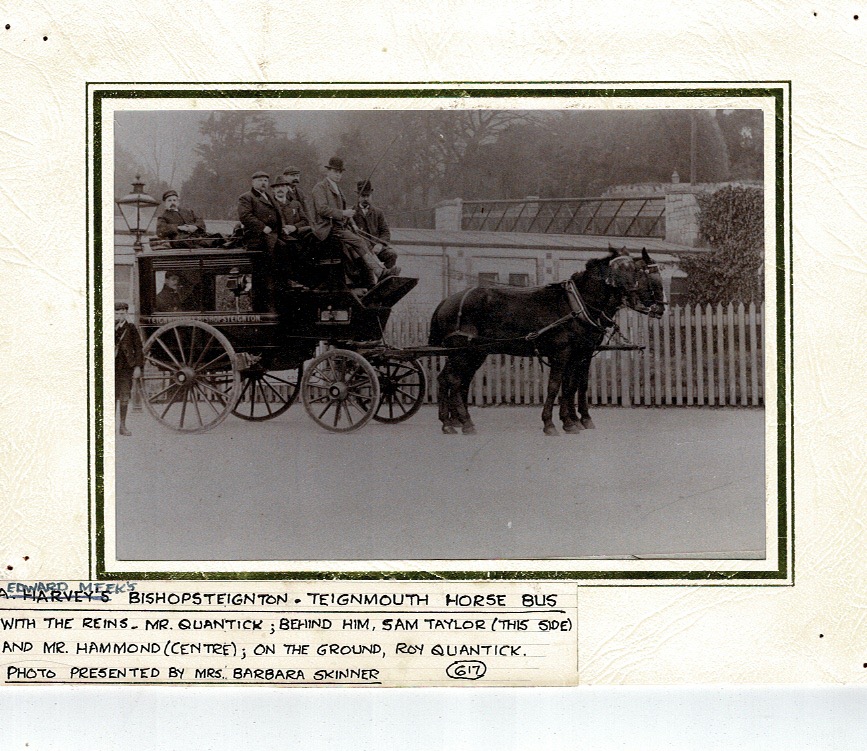
Harvey horse drawn bus driven by Samuel Quantick.
I have many happy memories of the next few years, during which Mr Gourd’s business grew. Unlike our modern ways, Mr Gourd ran the service to suit the villagers. For instance, the bus only went to Newton Abbot on Wednesdays because it was market day. There was no demand for a bus on other days. On Saturday morning we all went to Teignmouth to the cinema and it was noted who came and no one was ever left behind even if the bus waited on the return journey. The bus then drove to the chip shop. Then, replete with a newspaper of chips, the lights were turned off for the courting couples, we drove home and, if Dougie was the driver, he played his mouth organ all the way. Happy Days!
Leaping ahead to later days, one of Gourd’s services was shopping, and, during the war, when the hit and run raids made Teignmouth unpopular, the driver took orders to buy fish, cod or haddock on the order made no difference, you had to take whatever fish was available. The bus smelt terrible and the unfortunate driver sat nearly knee deep in damp fish parcels – he must have had a job with the gears. Overcrowding was ignored in the war years. The bus often packed like sardines with one or more hanging on the steps outside the door.
Marriage and family
To return to my courtship, Fred and I were married in 1933 and went to live in a newly built bungalow in Coombeway.
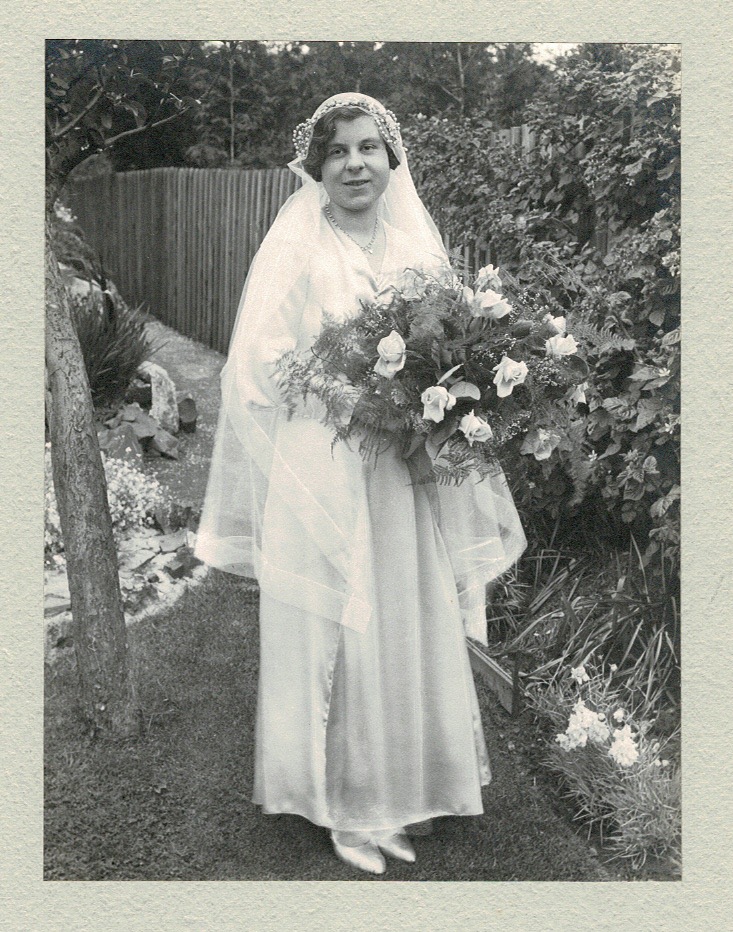
Edith Quantick on her wedding day
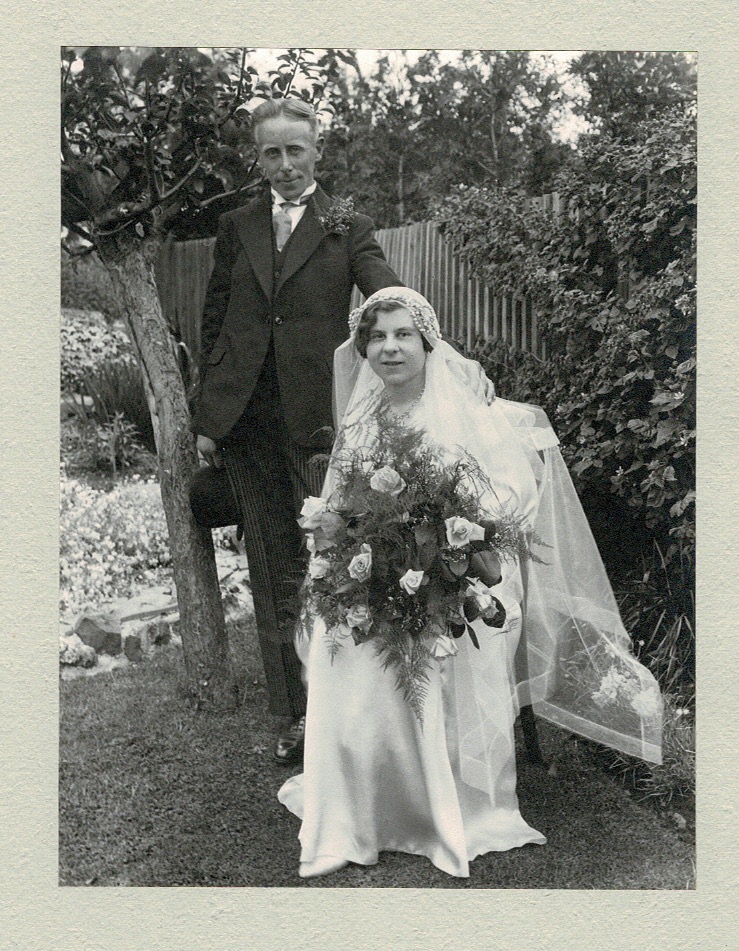
Edith and Fred Quantick on their wedding day
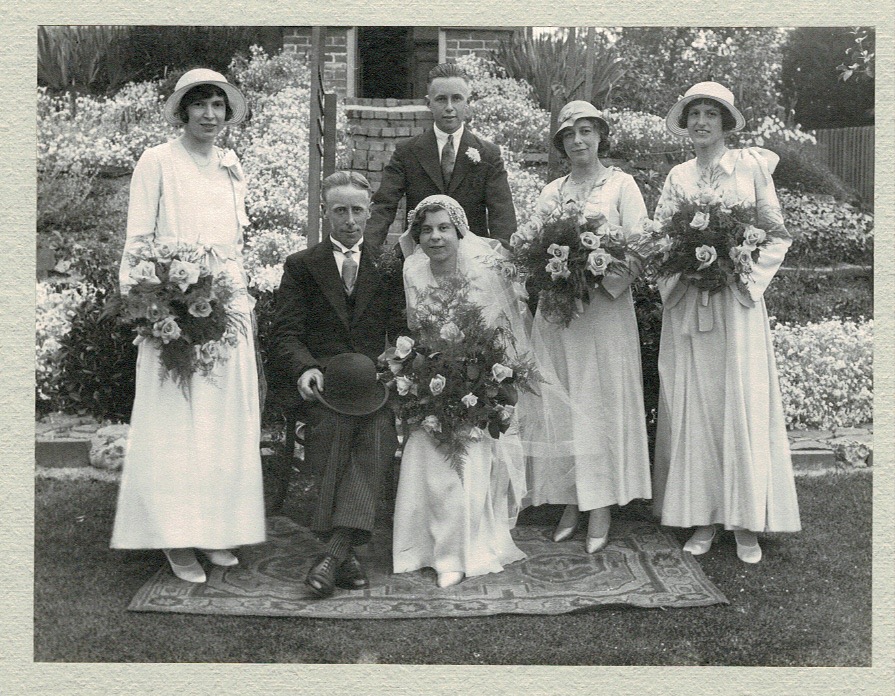
Quantick Wedding party
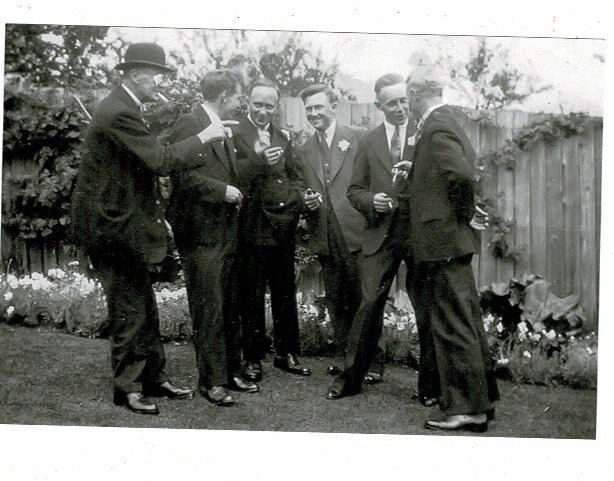
Quantick brothers after Fred & Edith’s wedding (Samuel Quantick on the left)
My first part time job was the most exciting I have ever had. Major Rayner was living at Moors Park and when he put up for Parliament he needed a secretary, and the Conservative people recommended me. I remember the Major’s little girl Fleur was about three years old, she spent a lot of time with me. For some reason we had a map spread on the table with a lot of movable flags. Fleur amused herself shifting them about – later I had to replace them all. After the election I remained as secretary and when the Rayners moved to Ashcombe Towers a car was sent for me when I was needed. My job ended when, as his duties increased, the Major had to spend time in London. After that life was pretty quiet until we got involved in the war.
WWII
Fred was rejected for the armed forces and joined the fire service. It was fortunate that no service was needed in the village, as the hosepipe they had wasn’t long enough to reach from the hydrant to the houses! I had my son David then and we shall never forget the frights we got in the hit and run days. One night we heard the plane coming and dived under our bed. The devastating crash of the falling bombs echoed around the valley and the air was full of cordite. Newcomers to the area don’t know that the passing place at the top of the road through Coombeway is where the bombs dropped that night. One Sunday afternoon we had a worse scare. After that night raid we were given a Morrison shelter, which almost filled our kitchen, we used the top for our meals. We were just going out for a walk when we heard the plane – the siren was hardly used in these raids – it was all over in a few seconds and the planes flew in low over the sea so they were not seen. We dived under the Morrison, his machine guns were chattering as he flew over our house. I looked out of the window and saw the enormous black plane just skimming over the roof of the house next door.
We had an evacuee (Jean Hamilton) and she did not forget us. Many years later she was here on holiday and traced me to my new address (I was back at Ashtead then).
Later Life
I next made use of my musical knowledge and taught the piano to many of the village children, and later adults in Torquay and Teignmouth. For fifteen years I was pianist in Mrs Tewson’s preparatory school in Teignmouth. I have been a member of the British Legion since 1957 and have received two awards for my work there. The sewing and knitting group I led made over £1,000 for the funds. I wrote several one-act plays, which we used to entertain the O.A.Ps at our annual party for them, which was paid for, (and still is) by carol singing.
(Edith and her family were involved in village carnivals and other celebrations. She entered floats into the carnival processions manned by her music students)
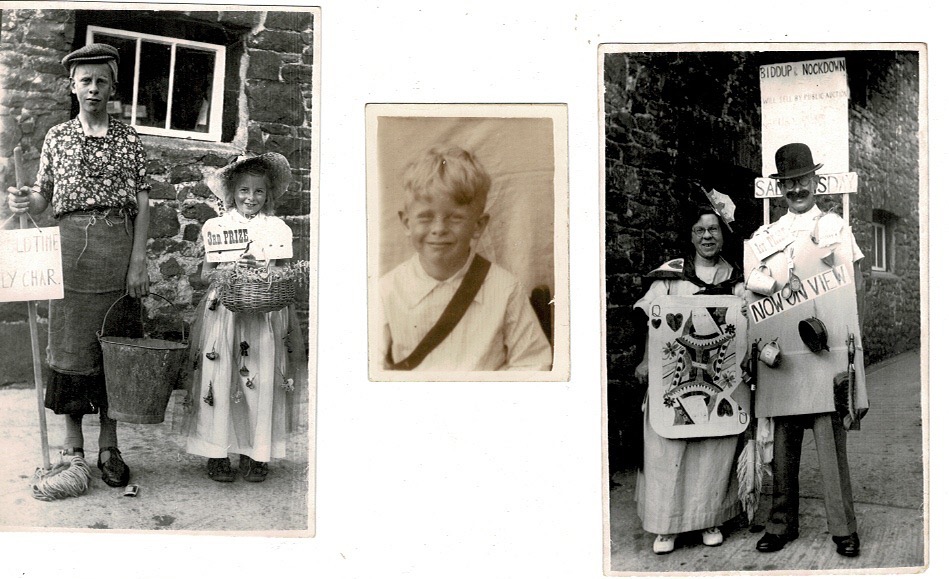
Quantick Family
David and Mavis David Edith and Fred
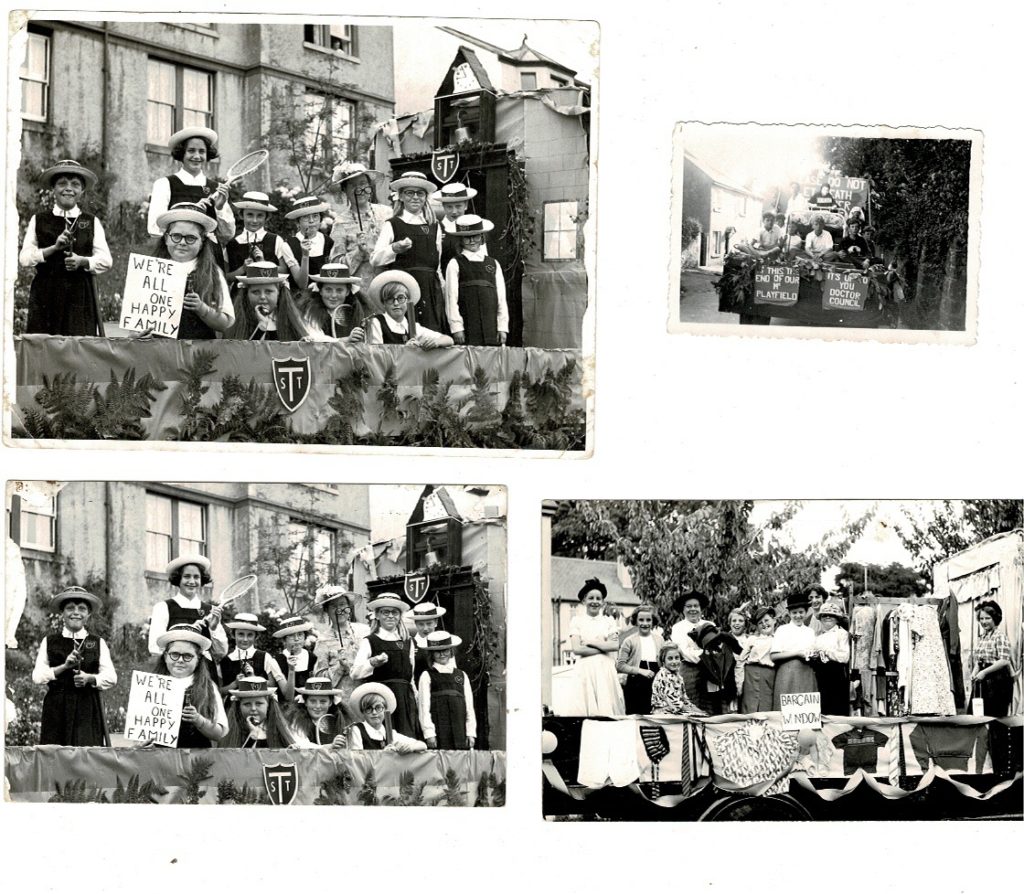
Quantick carnival floats
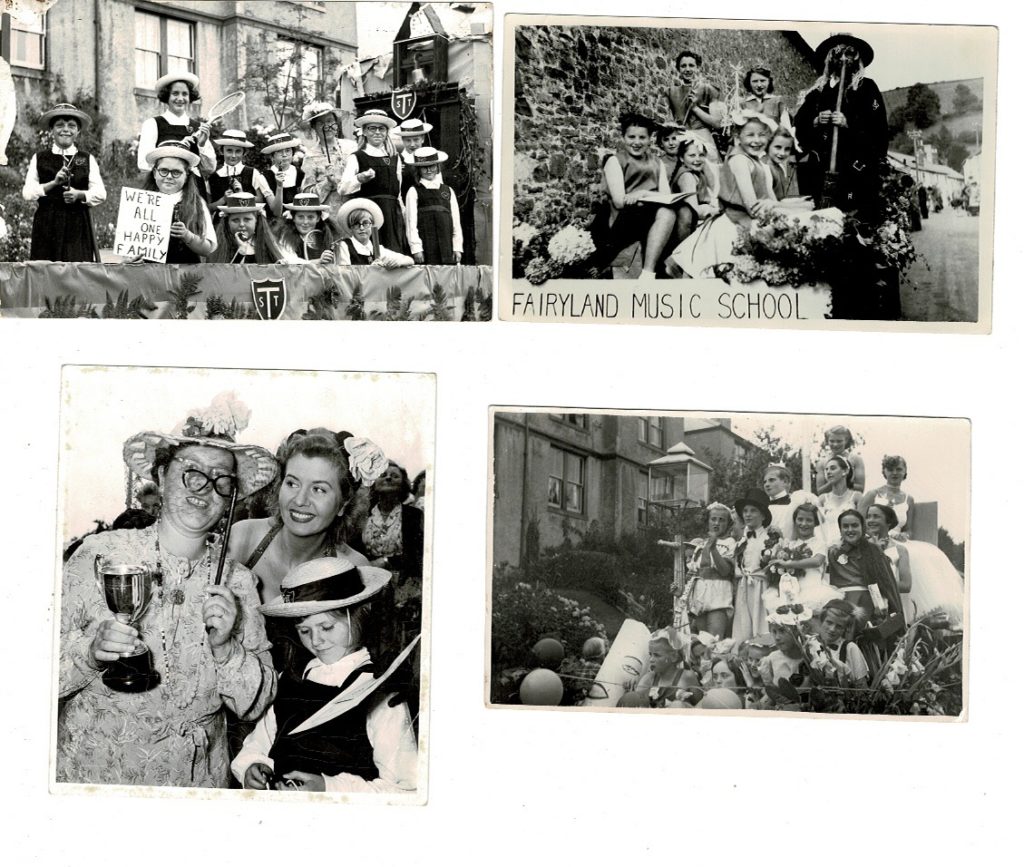
Quantick carnival photo
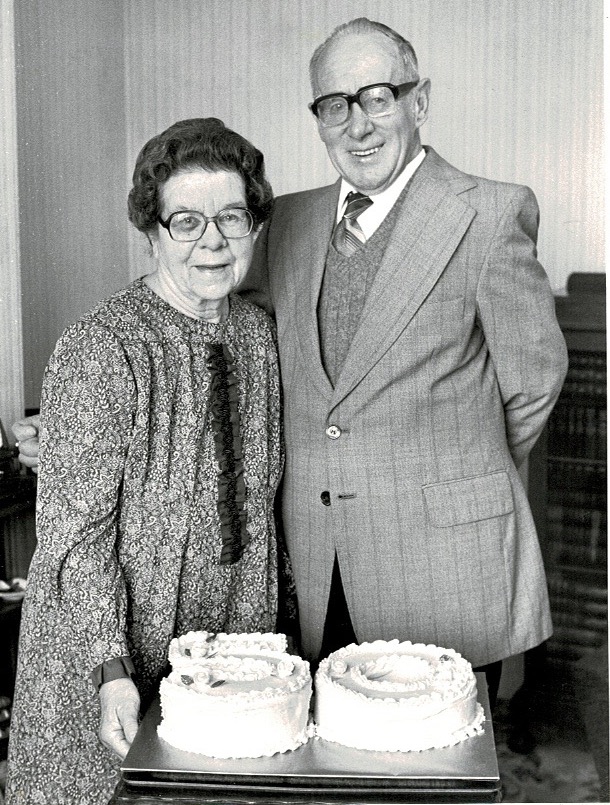
Edith and Fred Quantick Golden Wedding 1983
I am lame now and cannot get about well. After my husband’s death in 1986 I considered moving from Ashtead and now live in a bungalow in Bishops Avenue, all of which was fields when I first came here. My son David lives with me and we have many pleasant trips in his car exploring our delightful countryside. I always say South Devon has it all – the best in England.
Transcribed and published with the kind permission of David and Mavis Quantick.
A recorded conversation with David Quantick is on the audio memories page.
https://www.bishopsteigntonheritage.co.uk/people/bishopsteignton-audio-memories/

